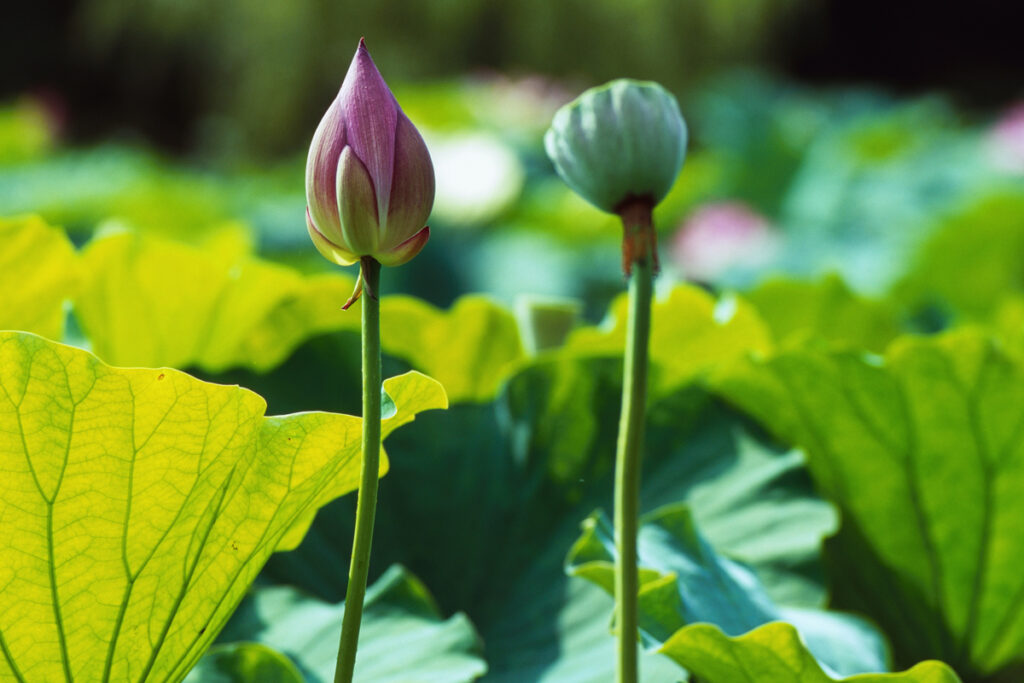Finding Peace in Uncertainty
by Surapsari Megumi Fujimaru

The passing of your spouse significantly altered your life. You don’t know what the future holds for you. Since it is scary and overwhelming, you may unconsciously take an escape strategy: emotional eating, drinking, shopping, dating — sound familiar? Unfortunately, it will not work. Whatever you do to avoid uncertainty, you must face it after the temporary satisfaction has gone.
Navigating your journey will get much easier once you accept the unpredictable nature of life and learn to live with it instead of resisting.
Visualize a lotus sprouting and growing a stalk in the water. It constantly sways with the current but does not suffer because it is the way to be. The lotus fully accepts the swinging movement and has peace with it. Isn’t it great if you could live like a lotus?
Finding peace in uncertainty is one of the most important and necessary skills for you to have. Here are four tips you can use to cope with uncertainty.
Daily Routine
Establishing a daily routine will help you gain a sense of stability and normalcy during uncertain times. It is comforting to have some control over your daily activities when everything else feels like it’s spinning beyond your power. Creating and following healthy daily habits will also help you feel good in your body and mind.
Morning: How you start the morning sets the tone for the rest of the day. Here are some ideas to feel calm, strong, clear, and grounded at the beginning of the day:
- Rise early.
- Try gentle exercise such as stretching, yoga, and walking.
- Take a quiet time without distraction from social media, texts, emails, YouTube, and TV.
- Enjoy soothing herbal tea.
- Have a nutritious breakfast.
If you have an early morning work shift, a young child, or someone else you take care of, you may feel like you don’t have time to try any of the above ideas. Here is the truth: the busier your life gets, the more you need to slow down and take care of yourself. Can you get up just 10 minutes earlier for a quiet tea time before starting your busy day? How about doing a 5-minute stretch right after arriving at your workplace?
When I had a full-time job that started at 7 am, I set up a balanced breakfast the night before. I placed grain, veggies, and proteins (leftovers from the dinner) in pans and stored them in the refrigerator. I heated the food the following morning while getting ready for work. Eating a hearty breakfast gave me the power to stay strong and emotionally stable throughout the day.
Daytime: Non-stop activity is taxing and eventually causes stress. On the other hand, being sedentary is not good either. It creates heavy energy and will put you in anxious mode. The key to well-being is balance. Try to alternate activity and relaxation, interpersonal communication and self-exploration, or indoor time and the time spent outdoors.
- Incorporate physical exercise and self-enrichment activities such as reading, journaling, and meditation into your life.
- Take quiet time after socializing.
- Spend some time outside after staying indoors for a while.
Evening: A good night’s sleep is vital to a calm mind. Reduce your activities and stimulus in the evening and prepare yourself for optimum sleep.
- Finish dinner early.
- Turn off communication and entertainment devices a couple of hours before your bedtime.
- Choose relaxing and calming activities such as warm bath, self-massage, reading, journaling, and herbal tea time.
- Go to bed early.
Early bedtime is necessary for getting up early the following morning. Try disconnecting your cellphone and laptop after dinner and see how it makes you sleepy early, even if you are a night owl!
Decision-Making
Making decisions becomes a struggle when we are dealing with an unpredictable future. The fear of making the wrong choice immobilizes us and leads to the frustration of being stuck. If this is your experience, I suggest you take on a new perspective: Instead of pondering which option is better, see all the options as equally good. Options A and B are both beneficial but will yield different results. Whatever consequence you take will serve you well in the long run. Life is a journey where we can enjoy a variety of views along the way. Different options create different sceneries. Option A may take you to your destination on a highway, while option B may let you stroll a field before reaching the same place: You could meet interesting people or see lovely flowers on your way. Who knows how that extra experience will enrich your life?
When I became a widow, I had to take a part-time job to supplement my income. Hours of Googling and job interviews left me with two potential job positions: after-school teaching artist and bookstore clerk. After agonizing over the choices, I decided to try the former. I thought I could use my artistic creativity and experience of homeschooling my son. I tell you — it was a disaster! Trying to get attention from a dozen wild kids wore me out, and I dreaded returning to the school. But I discovered something I would not know without trying the job: my strong need to serve adults using my creativity and life experience. I quit my job in a week with shattered self-confidence, but the whole event was a blessing in disguise. I got a new job that satisfied my creativity and did not involve interaction with children! I did very well with the part-time job and was promoted to a full-time position next year. My failed part-time job made me realize my strength, weakness, and needs and helped me secure a job that saved me from financial worries.
Take It Light
Do you sometimes catch yourself frowning or raising your shoulders? Do you often feel uptight? There are times when we need to get serious to deal with challenges and solve problems. However, life flows much better in general if we are sincere and light instead of serious and heavy. When we are too serious, we are rigid and grasp onto a certain idea or situation. That tight energy does not help us find new openings we need in our transitions. It is like trying to scoop water with a fist. Being too serious could also lead to a big disappointment if things don’t go as we hoped (which often happens). As Bruce Lee said, be like water. Trust life, join its flow, and watch where you are going!
If you catch yourself being too serious, watch a good comedy film, listen to your favorite music (choose a joyful one), have fun with your friends, or do other things that relax you and make you smile.
Stay in the Present
Whenever you wonder what could happen next or worry about the future, you have left the present and gone to the fantasy world. None of your concerns and worries are absolute truth. It is just your imagination, even if you believe otherwise. Truth is what is happening right here, right now. It is what you see, hear, touch, and smell. Consciously choose to stay in the present and catch yourself when you drift away into the future.
When you feel anxious about the unforeseeable future, pay attention to your breath: Is it fast, slow, choppy, steady, shallow, or deep? Whenever your attention leaves your breath and you start thinking, acknowledge your thought without judgment and bring your attention back to your breath. Continue this process until you feel calmer. After the breath exercise, observe what is happening right now. What do you see, hear, and smell?
If anxiety returns, take it as a physical sensation (e.g., tightening in the heart, choking in the throat). Watch how it gathers force, comes to a peak, loses intensity, and eventually disappears.
Learning to stay in the present (a.k.a. mindfulness) is a game-changer. It will greatly help you cope with uncertainty, but you will need to practice it. Seek professional help (e.g., a psychotherapist, doctor) immediately if you suffer from emotional distress such as depression, despair, rage, and terror, have suicidal thoughts, or experience stress-related physical symptoms such as migraines, IBS, and pain.
Facing uncertainty is scary, but you are not alone in this challenge. Connect with fellow widows by joining a regional or virtual Modern Widows Club community. It will help you gain the strength to face uncertainty and find peace in it.
Surapsari Megumi Fujimaru is a Board Certified Coach and mindfulness teacher. She helps widows overcome the most challenging phase of their widowhood and create a new life they love using mindfulness practices, a holistic health approach, and deep inquiry. She works with her clients via Zoom and at her private retreat facility in the Texas Hill Country. Visit her websites, lifetransitionguidance.com and surapsari.com, to learn more about her services.

